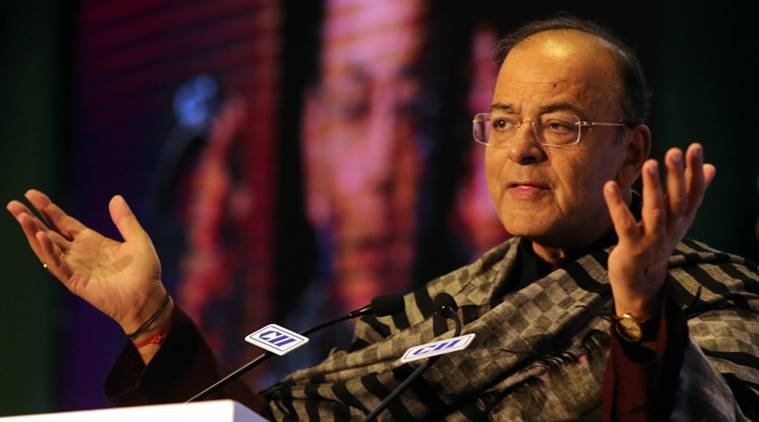 Finance Minister Arun Jaitley (Express photo by Prem Nath Pandey)
Finance Minister Arun Jaitley (Express photo by Prem Nath Pandey)
Mounting a scathing attack on the Congress a day after Rajya Sabha Chairman M Venkaiah Naidu rejected the Opposition notice for a motion of impeachment of the Chief Justice of India, Union Finance Minister Arun Jaitley Tuesday said the “object of the notice was not the passage of the motion but intimidation of India’s judiciary”.
He said there was “a growing tendency of lawyer Members (of Parliament) to drag intra court disputes into the parliamentary process”.
In a Facebook post headlined Why the Malafide Impeachment Motion was bound to fail?, Jaitley, who is also Leader of the House, said the Congress decision to challenge the rejection of the impeachment motion notice in the Supreme Court is “a suicidal future move of the Congress”.
Cautioning the Opposition party, he wrote: “For the Congress party to carry forward its mistake of subjecting legislative processes to judicial review would be a blunder. The Parliament is supreme in its own jurisdiction. Its process cannot be subjected to judicial review.”
“The Congress party is capable of dragging the judges into an unsavoury controversy and make them controversial, should their judicial opinion not appear favourable in the cases in which the party has an interest. To any political analyst, it was clear that the impeachment motion would never get support of two-third majority in both Houses of Parliament. The Congress party knew this. Its object was not the passage of the motion but intimidation of India’s judiciary.”
Targeting “eminent lawyers” who are “now Members of Parliament”, Jaitley, a successful lawyer himself, began his post stating: “Business persons and industrialists have frequently been accused of attempting to influence policy by using parliamentary processes. Some motivated questions are raised and letters are written by Members of Parliament at the behest of business interests. These were conventionally the traditional methods deployed in trying to use Parliamentary processes to help business interests. Many of these tactics stood exposed and over the years the system was able to analyse and distinguish some of these subtle and blatant attempts.”
“The new phenomenon seems to be somewhat different. A very large number of eminent lawyers are now Members of Parliament. Most political parties have given nominations to some of them since their value, both in court and Parliamentary debates, is significant. The incidental impact of this has been a growing tendency of lawyer Members to drag intra court disputes into the parliamentary process. The misconceived motion for the impeachment of the Chief Justice of India is just one example of this.”
Pointing out that an impeachment motion “was intended to be filed in the rarest of rare cases”, he said “these cases would include those where a ‘gross misconduct’ has been indulged in by a delinquent judge during his tenure as a judge. There has to be strong and hard evidence to substantiate this. Hearsay and rumours are not a substitute for evidence. The present impeachment motion has been filed on untenable grounds. It has been filed for collateral purpose to intimidate the Chief Justice of India and other judges of the highest judiciary.”
“The Congress party has indicated that it would now challenge the order of the Chairman, Rajya Sabha declining to admit the motion, before the Supreme Court. In parliamentary practice, several types of motions and resolutions are proposed under the Rules of Business. The Chairman/ Speaker of the either House of Parliament have the sole discretion whether to admit the motion or to decline to do so. The power to admit or to decline a motion is part of the legislative process of Parliament.”
“A motion under Article 124(4) is no different from any other motion where Chair has a discretion to admit it or decline to do so. There is a conventional view that the exercise of the discretion by the Chair of either House is not justiciable in the court of law. This view gains support from the observations made in the majority opinion of Justice J S Verma in the 1992 case (Sarojini Ramaswami vs UoI) where the court held: ‘On initiation of the process in the prescribed manner, the Speaker/ Chairman is to decide whether the accusations require investigations. If he chooses not to act on the accusations made in the form of a motion by a minimum number of Members of Parliament, the matter ends there’.”
Describing the impeachment motion as “poorly drafted”, Jaitley said: “Unquestionably the impeachment motion was poorly drafted. The level of proof required to impeach a judge of being guilty of ‘proved misbehaviour’ has to be proof ‘beyond reasonable doubt’… The Congress party’s argument that they are making vague allegations which can only be proved in an inquiry is not tenable. Vague and unsubstantiated allegations can never be a basis of a roving fishing inquiry against the holder of a high office.”